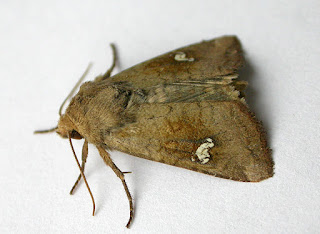The garden species count for 2024 passed 500 during the second half of July but by the end of the month the list would normally be around the 600 mark and I'm nowhere near that total yet. It means that passing 700 species for the year (as has happened in four of the past five years) is looking nigh on impossible to achieve now. The current heat-wave produced 120+ species between the two traps each night on the 29th, 30th and 31st but catches on the latter two nights had the look of mid-August about them, with quite a lot of moths but only very few newcomers for the year. Amongst the additions over this period were:
(16th) Yponomeuta rorrella, Dioryctria abietella, Pine Hawk-moth, Dark Umber, Waved Black
(17th) Oegoconia species (retained), Batia lunaris, Brachmia blandella, Dusky Sallow, Double Lobed
(18th) Bucculatrix nigricomella, Gelechia senticetella, Lobesia abscisana, Eucosma campoliliana, Acrobasis suavella, Haworth's Pug, Webb's Wainscot, Broad-bordered Yellow Underwing, Least Yellow Underwing
(19th) Enarmonia formosana
(20th) Eucosma conterminana, Cydia splendana, Cydalima perspectalis
(21st) - nil -
(22nd) Pammene aurita, Oncocera semirubella, Agriphila selasella, Catoptria pinella, Tree-lichen Beauty
(23rd) Cameraria ohridella, Gelechia rhombella, Elachista utonella (retained), Pyrausta purpuralis, Udea lutealis, Lesser Cream Wave, Slender Pug, Maple Pug, September Thorn, Jersey Tiger, Straw Underwing, Small Wainscot, Mere Wainscot
(24th) Ear Moth species (retained)
(25th) Orthotelia sparganella, Apotomis betuletana, Buff Footman
(26th) Roeslerstammia erxlebella, Coleophora hemerobiella, Aethes rubigana, Olive
(27th) - nil -
(28th) Yellow-legged Clearwing (daytime, to lure), Mompha propinquella, Eucosma obumbratana, Dusky Thorn
(29th) Nemapogon clematella, Phyllonorycter harrisella, Ypsolopha horridella, Lyonetia prunifoliella, Sorhagenia rhamniella (retained), Bryotropha domestica, Large Twin-spot Carpet, Plain Pug, Marbled Beauty, Lesser-spotted Pinion
(30th) Epinotia nisella, Pyralis farinalis, Gypsy Moth
(31st) Helcystogramma rufescens, Gynnidomorpha alismana (retained), Bactra lancealana (retained), Peacock Moth
 |
| Orthotelia sparganella, Westcott 25th July |
 |
| Likely Elachista utonella, Westcott 23rd July |
 |
| Gelechia rhombella, Westcott 23rd July |
 |
| Udea lutealis, Westcott 23rd July |
 |
| Ear species, Westcott 24th July |
 |
| Double Lobed, Westcott 17th July |
I'm reasonably sure that the Elachista above will turn out to be utonella but albidella can be quite similar and I've had both in the garden. The Ear looks interesting and I wonder if it might actually be a wandering Saltern Ear, but dissection will hopefully sort that out. I've only ever had Ear Moth in the garden.
Dave Wilton Westcott, Bucks

This puts my 200 in perspective Dave - and encourages me to keep going :-)
ReplyDelete200 in a couple of months is no mean feat if you are new to mothing because you must be grappling with all the ID complexities as well. Keep at it! The number of species you will eventually get depends on a lot of factors, not least being your local habitat, how often you run the trap and how keen you are to delve into our smaller moths.
Delete